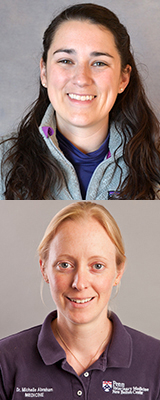 New Bolton Center’s foaling experts, Drs. Michelle and Jennifer Linton, will share details on dealing with dystocia cases, highlighting their various specialties, as part of the First Tuesday Lecture series.
New Bolton Center’s foaling experts, Drs. Michelle and Jennifer Linton, will share details on dealing with dystocia cases, highlighting their various specialties, as part of the First Tuesday Lecture series.
The presentation, “Dystocia: How to Deal with a Difficult Birth,” will take place on Tuesday, March 6, 2018 at 6:30 p.m. in New Bolton Center’s Alumni Hall, 382 West Street Road, Kennett Square, PA.
With any foaling, every second counts. While many mares are able to deliver their charges with ease, broodmares of all experience levels face unexpected challenges.
“A complicated foaling is one of the true equine emergencies,” emphasizes Dr. Jennifer Linton, Associate Professor of Clinical Equine Field Service and board-certified Theriogenolgist. “After 40 minutes of active labor, the chance of survival for the foal drops off drastically.”
The duo will compare and contrast what owners can expect during the foaling process, the importance of a vigilant eye, and when calling your veterinarian is absolutely necessary.
“Foaling is an exciting time, but it can be nerve-racking for horse owners,” shares Dr. Michelle Linton. A board-certified Internist, Michelle specializes in the management of late gestation mares, neonatology, and runs the Healthy Mare Foaling Program at New Bolton Center.
“Preparation is the key because everything can happen so fast. You need to know what to expect, when to recognize a problem and what to do if you suspect a problem.”
The lecture is free and open to the public. Due to limited seating, registration for the event is recommended. Please visit https://firsttuesdaynbc.eventbrite.com to register.
For any questions about the First Tuesday Lecture series, please contact Barbara Belt at 610-925-6500 or beltb@vet.upenn.edu.
Spring First Tuesday Lecture Line-Up:
April 3: Dr. Helen Aceto and Dr. Rose Nolen-Walston, “Bad Bug, Bad Bug, Whatcha Gonna Do?”
May 1: Dr. Elizabeth Davidson and Dr. Liz Arbittier, “Sports Medicine”
June 5: Dr. Dean Richardson, “Cool Things About Equine Anatomy”
About the First Tuesday Lecture Series:
The First Tuesday Lectures, free and open to the public, are presented September through December, and March through June. During the series, faculty and clinicians at New Bolton Center share current information on equine topics of interest to horse owners and caregivers. Many of the lectures highlight the advanced techniques performed by Penn Vet’s team of leading clinicians, and the state-of-the-art equipment and facilities available to ensure the best possible outcomes for patients.